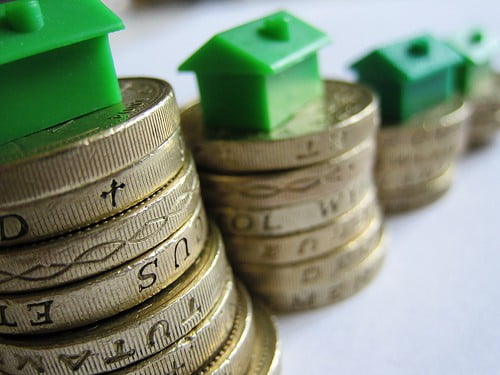Last week, I did some digging on mortgage rates and had a talk with my mortgage banker, who happens to be a work friend of my Dad’s. After talking for a bit, she found me a rate that seemed almost too good to be true. 2.875% is a big improvement from my 4.25% mortgage. I did an analysis to figure out the best decision for me.
Figure Out Your Current Mortgage Costs
The first thing I did was figure out the remaining interest costs on my mortgage assuming I don’t pay it off early. I made that assumption to be consistent in my analysis. I knew it would not be the case, but I wanted to be more conservative in my cost calculation and this method results in the highest interest cost possible.
I keep an amortization schedule for my mortgage and update it monthly, because I am a finance nerd, and just had to add up the total interest remaining. I encourage everyone to keep a running amortization on their loans to encourage them to make early payments.
For my amortization, I use a simple Excel template. I also added a few cells that calculate my interest saved from early payments. That number is currently $4,587.76 from $1,762.48 in early payments.
For the outstanding life of my mortgage, my scheduled interest remaining was $70,248.36.
Calculate Expenses from New Mortgage
For the new mortgage, my total interest over the life of the loan would be $25,614.12. Part of the savings comes from a lower interest rate. The rest comes from changing from a 30-year-fixed to a 15-year-fixed loan.
For the new loan, my banker anticipated closing costs around $1,500. That means the total cost of my new loan is about $27,000 dollars. That is almost $50,000 lower than my current mortgage. While the monthly cost is $177 higher, it is worth that to me to save 500 Benjamins.
Taxes – Another Variable
I ran this analysis fairly quickly and found that my savings would easily make sense. However, some people might bring up taxes. Currently, most of us can deduct all of our mortgage interest from our income.
Your mortgage interest will be highest in the first year, and slowly decrease over the life of the loan. My 2012 interest was $4,306.33. At a 25% tax rate, that leads to a $1,076 savings on my taxes. While that will go down every year, assuming I can save $1,000 per year is still only $30,000. That does not make up the $50,000 benefit of saving on the interest.
Also remember, I will write off taxes on the new loan, just less.
Finally, remember that tax codes change. The President and congress are arguing about discussing new potential tax code changes that may remove the mortgage interest deduction, or make other changes to how it works. This is not something I would bank on, so I did not include it in my analysis at all.
Early Payments – A Complicated Variable
Some of you smart folks may ask, if you are going to pay $177 more, why not just put that into your current mortgage and save on the fees?
I ran that analysis too. Assuming I paid the difference of the current mortgage and refinance as an extra payment, my total interest expense on the current loan drops from $70,248.36 to $40,326.13. That is the power of early payments. Less than $200 a month leads to a $30,000 savings without changing my current loan.
From $40,326.13 to $27,000 makes the decision a bit more difficult. Factoring in the tax deduction on that $13,000 difference makes it even more complicated.
I chose to leave out the extra payment from my calculation, though, because I am human. Even a finance nerd like me enjoys having cash on hand. I can invest it, spend it, roll around in a pile of dollar bills. That $177 becomes an opportunity cost (for economics folks). If I am locked in, I am sure to pay it each month. If not, what’s to say I won’t do something else with it. Even the best of us might not have the willpower to keep on the extra payments for the next 204 months. That is 17 years!
What Did I Decide to Do?
Well, if you know me, you know I would rather save $50,000 than spend it. I am in the refinance process right now. I have filled out the new loan application, sent in my tax returns, sent in my bank and investment statements, paid my application fee, and have my appraisal scheduled for Monday.
In addition to saving $50,000, I am also cutting about 13 and a half years from my mortgage. That puts me about 15 years from being debt free. And that assumes no early payments.
Your Thoughts on Refinancing?
Have you ever refinanced a loan, mortgage or otherwise, or considered it? What was your story and what did you decide to do? Please share your thoughts in the comments.
Image by Images_of_Money / flickr


We never re-financed (we’ve only had two mortgages). Just made the extra payments. Of course, when we had our mortgagges, interest rates were rising so it wouldn’t have made sense to refi.
I am guessing you are all paid off now? Congrats!
2.875%…wow! We refinanced earlier this year with closing costs of $400; we went from a 30 year mortgage to a 15 year mortgage, and from 5.5% to 3.5%. Woohoo! It felt GREAT, and even moreso when we see much higher principal payments each month than previously.
Good luck with everything!
Those are some cheap closing costs! I had to do a new appraisal which was over $400 alone. Enjoy the 2% per year savings!
Sounds like a great deal Eric. Your analysis looks sound to me also. Enjoy saving some money.
I love saving money! Thanks Jason.